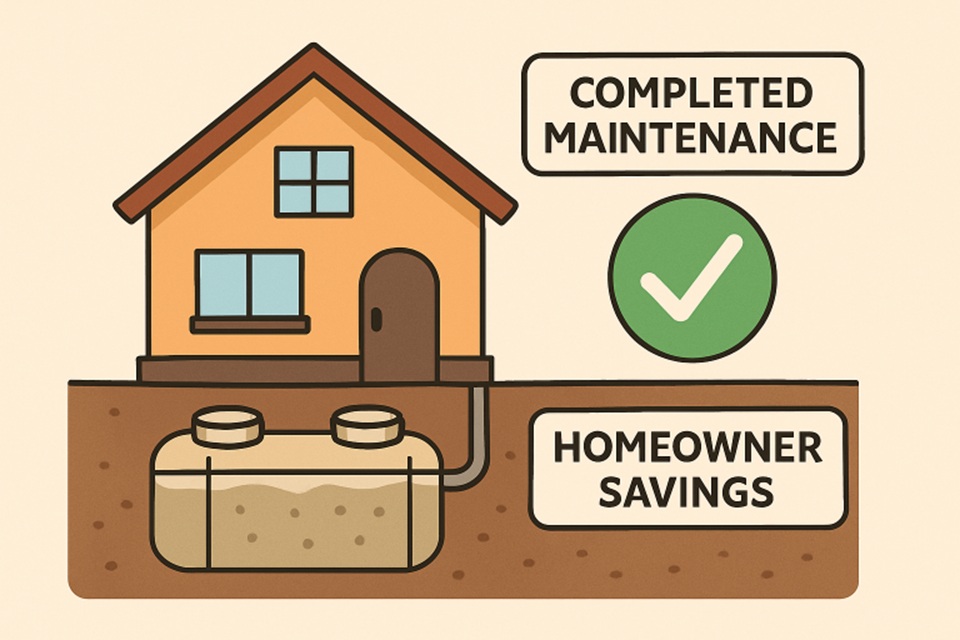Key Takeaways:
- Regular septic system maintenance prevents costly repairs and extends system lifespan.
- Proper care protects property value and ensures environmental safety.
- Implementing simple practices can lead to significant long-term savings.
Introduction
For many homeowners, the septic system is out of sight and out of mind—until a problem occurs. However, investing in routine septic pumping services is one of the most effective ways to protect your property, avoid major repairs, and maintain a healthy, functioning home. While septic maintenance might seem like just another chore, it’s a critical step to safeguard your home’s value and ensure a trouble-free wastewater system for years to come. Neglecting a septic system can lead to costly problems like backups, foul odors, and water contamination. Regular maintenance prevents emergencies, reduces health risks, and turns potential major expenses into manageable, scheduled costs. Well-maintained systems also benefit communities by protecting local water sources, supporting the environment, and alleviating pressure on municipal resources. Additionally, proper care preserves property value and provides peace of mind for homeowners and future buyers.
Protecting Property Value
When a home’s septic system is neglected, its value declines in the eyes of savvy buyers and real estate agents. Unresolved wastewater issues are a red flag during pre-sale home inspections and can stall or halt a sale altogether. Scheduling timely septic system repair, along with regular pumping, ensures that any issues are addressed before they become costly or visible to potential buyers. This proactive approach demonstrates responsible maintenance and reassures buyers of the property’s condition.
Increasingly, home listings highlight well-cared-for septic systems as an asset—especially for properties in rural or semi-rural areas. By maintaining yours, you’re not just saving on repairs, but also creating a competitive selling advantage. This attention to detail can translate to higher offers and a smoother closing process.
Preventing Costly Repairs
Unattended septic tanks fill with solid waste, leading to blockages that can cause sewage to back up into your home, contaminate groundwater, or even flood your property. Repairing a failed septic system due to a lack of maintenance can cost anywhere between $5,000 and $15,000—a financial blow few homeowners are prepared for. In contrast, scheduling regular septic pump-outs—typically every three to five years as recommended by the U.S. Environmental Protection Agency (EPA)—costs just a fraction of that amount. Consistent maintenance dramatically lowers the risk of emergency repairs and helps homeowners budget more predictably.
How Small Problems Become Big Expenses
Minor issues, such as a partially clogged filter or buildup, can escalate into system-wide failures if left unaddressed. Regular pumping removes accumulating solids before they can damage pumps or clog the drainfield. Investing in routine care not only helps keep your system healthy but also protects your indoor plumbing, landscaping, and the environment from the effects of untreated wastewater leaks.
Extending System Lifespan
Like any critical household infrastructure, septic systems require regular maintenance to deliver their whole expected lifespan—often 25 years or more. The cost of installing a new septic system can range from $10,000 to $25,000, depending on the property size and site conditions, making premature replacement a significant financial setback. By sticking to a consistent pumping schedule and monitoring for issues, homeowners may enjoy decades of reliable service from their existing setup.
The True Cost Of Replacement
The replacement dilemma is about much more than the upfront installation fees. It typically involves significant excavation, disruption to your yard, the need to update permits, and even possible fines for code violations if a failing system is left unchecked for an extended period. Proactive maintenance prolongs your tank’s health and performance, giving you much more control over your household budget.
Environmental Benefits
Well-maintained septic systems are vital for protecting groundwater, lakes, streams, and soil from contamination. System failures often result in the release of untreated sewage, posing a threat to both public health and sensitive local habitats. Regularly scheduled pumping removes these threats by safely containing waste and allowing the system’s treatment and filtration processes to function effectively.
In fact, septic system maintenance is increasingly linked to broader community health outcomes, as more regions rely on decentralized wastewater management. By participating in responsible upkeep, homeowners support clean water initiatives and reduce their own environmental footprint.
Best Practices For Septic Maintenance
Effective septic care extends beyond just pumping. Consider these habits to maximize savings and extend your system’s health:
- Schedule Regular Inspections: Hire a licensed professional to inspect your tank every three years and follow their guidance for pumping intervals.
- Conserve Water: Spread laundry and dishwashing loads, repair leaks promptly, and use high-efficiency fixtures to prevent overwhelming your septic system with excessive wastewater.
- Dispose of Waste Properly: Avoid flushing anything but toilet paper and human waste. Keep grease, non-biodegradable items, chemicals, and medications out of your pipes to reduce the risk of clogs and system imbalance.
- Protect and Maintain the Drainfield: Direct downspouts and surface water away from the septic area, and never park heavy vehicles on top to prevent soil compaction and system breakdowns.
For additional guidance, The Spruce offers detailed maintenance checklists and troubleshooting advice, making it easier for homeowners to adopt the proper habits. Regularly following these guidelines can help prevent costly repairs and extend the lifespan of your home systems. Staying proactive also ensures a safer and more comfortable living environment for your family
Conclusion
Investing in regular septic pumping is far more than just a prudent home maintenance task—it’s a proven way to avoid expensive repairs, add value to your property, and protect your local environment. With just a small investment of time and resources, homeowners can enjoy peace of mind, substantial long-term savings, and the confidence that comes from responsible stewardship of essential home infrastructure. By pairing pumping services with best practices and prompt repair when needed, you are setting your property up for decades of trouble-free operation and healthier living.
